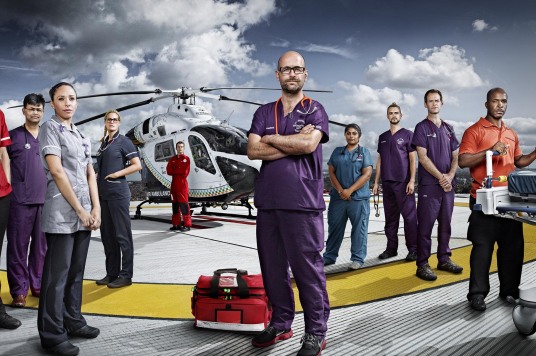A teaser for episode two of ’24 Hours in A&E’
The RTS award-winning documentary series continues at its new home, St George’s Hospital in south west London, which is home to one of Britain’s most advanced and busiest A&E departments.
Filmed around the clock by 104 cameras, the series captures dramatic and emotional stories of love, life and loss on the frontline of the NHS.
This week’s programme focuses on the treatment of men who’ve been injured on two wheels.
19-year-old Billy has been thrown twenty feet from his motocross bike during a race, suffering multiple spinal injuries and he’s lost sensation from the chest down. He’s been transferred from a hospital in Brighton to St George’s for treatment by the specialist neurosurgical team.
“Whenever we have a potential spinal injury patient coming in, you realise that’s a real time-critical injury,” says consultant Will. “If they have paralysis, we have to diagnose why they have it and see if there’s something that we can reverse. But unfortunately, with spinal injuries there is a higher possibility that this won’t get better.”
Billy’s parents and brothers witnessed his crash and are by his bedside, braced for the worst. “I’ve got three boys, they love fast sports. I didn’t discourage them from doing what they wanted to do. The main thing I didn’t want my boys to do was to ride a motorbike out on the road, “says Billy’s dad, Brad. “I just didn’t believe it, it’s as if they’re talking about someone else. You don’t ever expect it to happen, not to yours.”
Meanwhile 53-year-old teacher Dave has facial injuries after riding his new bicycle into the back of a stationary car in Richmond Park. His wife Kate received a phone call shortly after the accident. “It was his friend Bugsy, who he’d been cycling with. He said ‘There’s been an accident, he’s come off the bike and an ambulance is on its way’,” says Kate. “It was when he said ‘He’s lost part of his face and we’ve got it on ice’, that scared me a lot.” The crash is a wake up call for Dave. “What dawns on you is that you’ve absolutely no control over the situation at all,” he says. “That makes you a little more philosophical and it makes you realise you are quite vulnerable really. I should take life a little more easy, maybe I’ll go back to golf and fishing!”
And 30-year-old adrenaline junkie and ex-Royal Marine Richard has badly dislocated his thumb after falling off a bicycle. As the emergency team try to realign the tip of his thumb, Richard enjoys the effects of the pain-killing gas and air while reflecting on his time in the marines and the evolutionary benefits of risk.
Consultant Will talks about how risks are part of normal life. “There are calculated risks that we take. Most of the time you get away with it, you learn from it,” he says. “But every so often when you challenge yourself, you fall short.”


